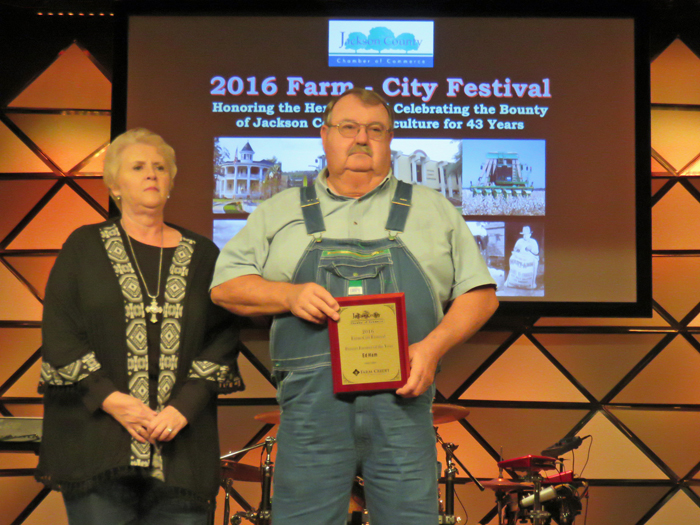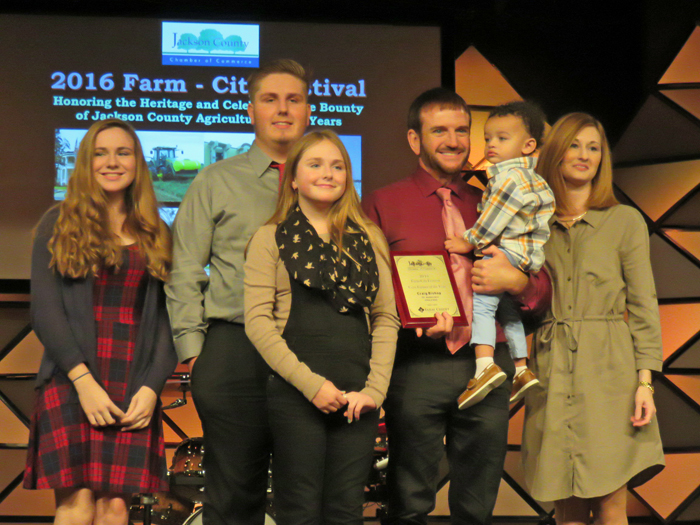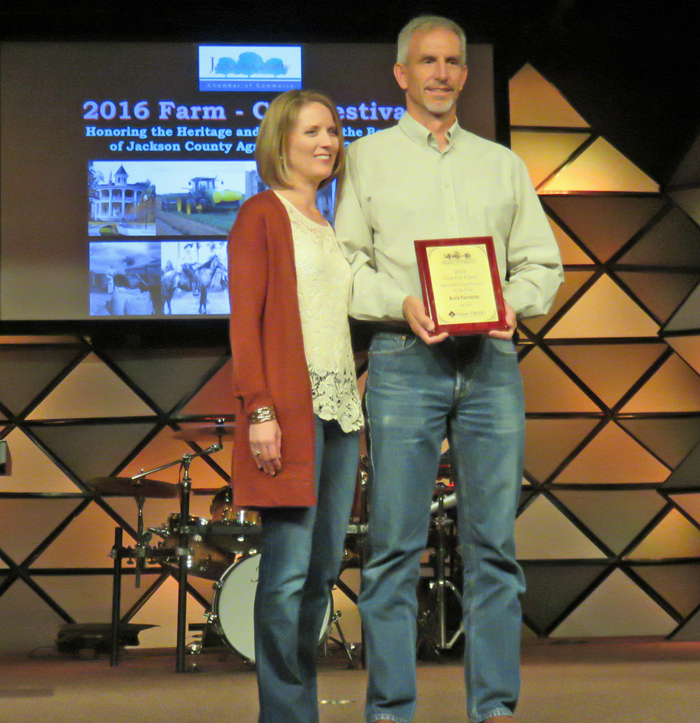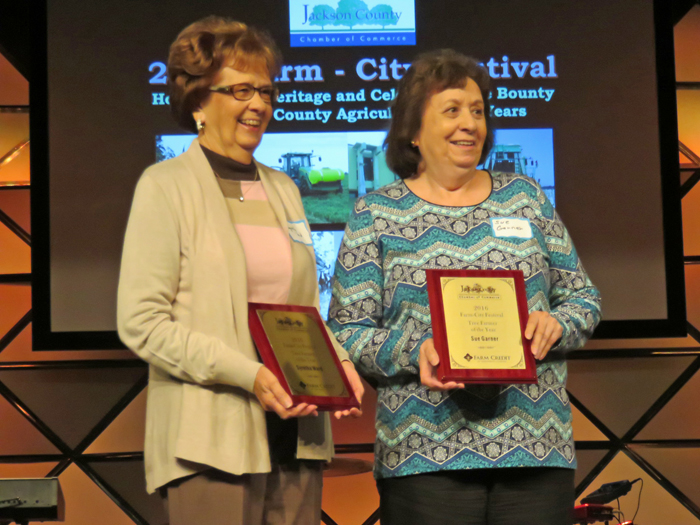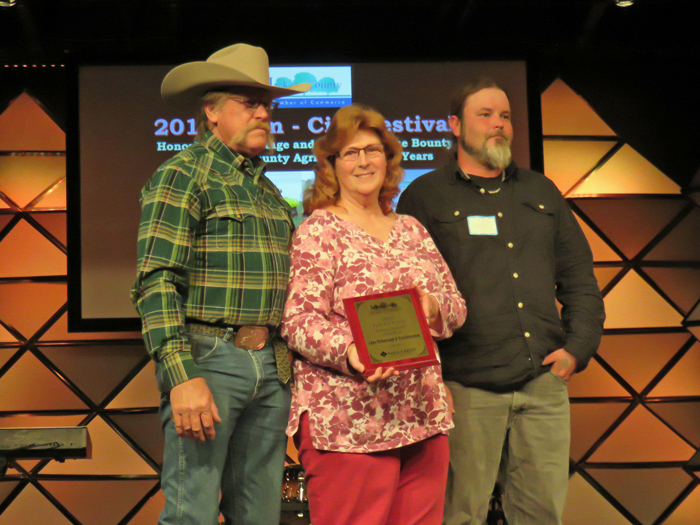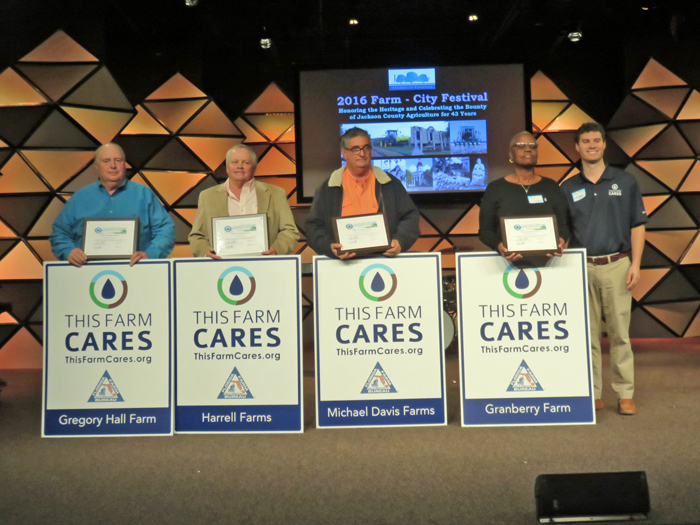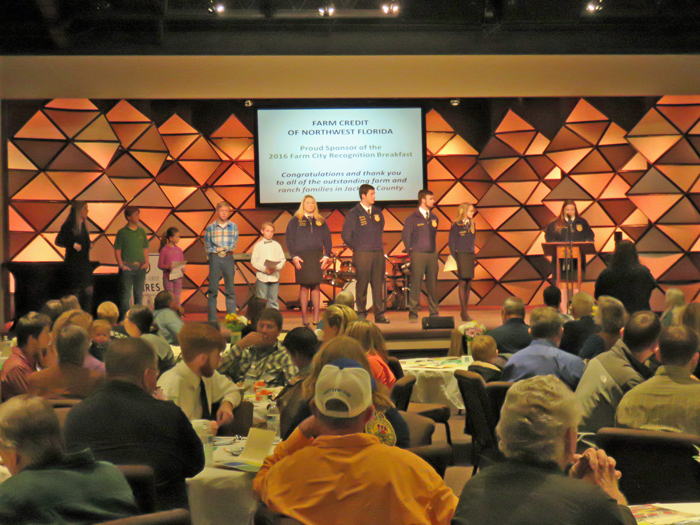 For 43 years the Chamber of Commerce and the has hosted a celebration during Farm City Week to bring together town and rural business owners with farmers and ranchers. The Farm City Breakfast was held on Friday, November 18th at Rivertown Community Church. There were 14 farm families honored along with highlight presentations from the 4-H Clubs and FFA Chapters in the county. The following were the families that were recognized this year:
For 43 years the Chamber of Commerce and the has hosted a celebration during Farm City Week to bring together town and rural business owners with farmers and ranchers. The Farm City Breakfast was held on Friday, November 18th at Rivertown Community Church. There were 14 farm families honored along with highlight presentations from the 4-H Clubs and FFA Chapters in the county. The following were the families that were recognized this year:
2016 Farm – City Festival Awards
 Ed Jowers Farm City Scholarship – Chelsea Edenfield
Ed Jowers Farm City Scholarship – Chelsea Edenfield
Each year the Jackson County Chamber of Commerce awards the Ed Jowers, Farm-City “Future of Agriculture” Scholarship to a recipient displaying exemplary scholastic, extracurricular & agriculturally centered achievements. Our recipient for 2016 is Miss Chelsea Edenfield.
Chelsea is a 2016 graduate of Malone High School. She came highly recommended by the faculty of Malone High with the phrases: responsible, dependable, motivated & hard-working, repeatedly used to describe her character. Throughout her school career, she was actively involved in various extracurricular & community service activities, while maintaining a respectable GPA. She was an active participant in FFA, 4-H, Beta Club & FCCLA. She served as President of the Jackson County Buckaroos 4-H Club her Junior year, and served as President of Malone’s FFA chapter her senior year.
In eighth grade she served as the coach for both the middle and high school horse judging teams. For 2015, their horse judging team placed 3rd, with Chelsea being honored as the First High Individual in the state. She also took other state honors by placing in the top 4 for Equine Science Proficiency, and top 7 in the Florida FFA Alumni Essay Competition. Chelsea is passionate about horses and her involvement with them does not stop at the classroom door. She also exercises, trains & cares for her own competition barrel horses.
Chelsea is currently continuing her education at Chipola College where she is pursuing a degree in Nursing. She has plans to obtain a career in our local community until she is ready to pursue her goals of becoming a traveling nurse.
The Farm City Scholarship is selected by the Scholarship Committee of the Jackson County Chamber of Commerce. The selection criteria for this scholarship include: a student from a farm family, pursuing a college degree in agriculture, and leadership and participation in 4-H and FFA activities.
 Outstanding Farm Family for 2016 – David & Kim DeFelix
Outstanding Farm Family for 2016 – David & Kim DeFelix
For at least four generations, the Paulk and DeFelix family has farmed in Jackson County near Campbellton. David’s great grandfather Joel Paulk, his Grandfather, Curtis Paulk, and his uncles Jeff and Frank Paulk passed the family heritage of farming on to him.
David DeFlix is a 1995 graduate of Graceville High School. In 1996, as a freshman student at Chipola College, David borrowed enough money to purchase his first 120 acres of farm land. David farmed full-time while also enrolled as a part-time student at Chipola and then Troy University. He literally farmed his way through college for seven years, but in 2002 David graduated with a degree in Business Management.
When David first started farming, he used his Granddaddy’s tractors and equipment. With this older equipment, however, he was spending more time as a mechanic than a farmer. In 1997 he bought his first tractor, and as David said it, “I’ve been working for John Deere ever since.”
David and his good friend Dexter Gilbert operated a custom cotton harvest operation for 10 years, to provide the extra income needed to grow their individual farming operations. Farming land he owned, land he rented, and the custom harvest business, he was able to gradually grow his business and puchase the family farm from his Granddaddy.
In 2006 David purchased his first center pivot irrigation unit. Over the last 10 years, he has gradually upgraded, so that all of the farm land he owns is irrigated. Much of the land he rents is still not irrigated, but in total 50% of the total cropland he farms is now irrigated. This was a key investment to reduce his risk in drought years. Even so his toughest years came in 2013 and 2015, not from drought but from an overabundance of rainfall at harvest time.
In 2010 everything changed for David. He married Kim Stevens, and all his hard work now had a new purpose. Finally, he had someone to share the farm life with, as well as a new generation to share his family’s farming heritage. Kim is a hard worker as well. David said, “I thought I worked hard until I met Kim. She can work circles around me.” The Steven’s family owns 12 auto parts stores in the region and have a cattle and horse farm as well. Kim pulls triple duty working in the parts business, family farming, and caring for her own family.
In 2013, David was recognized as the Cotton Farmer of the Year. Today DeFelix Farms is a high-tech, modern row crop operation. First and foremost, David, is a cotton farmer. They grow peanuts and corn as well, but cotton has always been their key crop with the largest acreage. This season David planted 800 acres of cotton, 300 acres of peanuts, and 100 acres of corn. In addition to the family farm, near Campbellton, he also rents land from Graceville to Greenwood.
David is one of only two Florida farmers serving on the U.S. Cotton Board. The Cotton Board is responsible for providing oversight of the economic resources devoted to the Cotton Research & Promotion Program. To fund the program, the Cotton Board collects a per bale assessment on all cotton ginned in the U.S., as well as on all cotton products imported into the U.S.
The Outstanding Farm Family is selected each year by a committee of past recipients for the Jackson County Farm Bureau.
 Cattleman of the Year – Kim DeFeLix
Cattleman of the Year – Kim DeFeLix
Two organizations have independently recognized the contributions of the DeFelix family to agriculture in this county in 2016. Not only were Kim and David honored by Farm Bureau as the Outstanding Farm Family, but Kim Stevens DeFelix is the first woman to ever be recognized as the Cattlemen of the Year by the Jackson County Cattlemen’s Association. David is the crop farmer and Kim is the cowgirl.
For at least three generations, the Stevens Family has been raising cattle in this area. Today the Stevens Family owns 200 acres of paradise located off Highway 71 south of Marianna on the Chipola River they call the Lazy S Ranch. Since she was 12 years old, Kim has been part of the cow-crew working on the ranch. Kim and her uncle Larry take care of the day to day operations and maintenance of the ranch. Kim also keeps the books and pays the bills.
The Lazy S Herd got its start from humble beginnings, from bottle fed calves from local dairies and from beef herds when calves were orphaned. Today the ranch is home to a 50 head beef herd and a 20 head horse herd used for working cattle and pleasure trail riding. Kim hopes in the future to upgrade the Lazy S herd, and possibly even build a cattle herd on the DeFelix Farm, if she can convince Mr. Paulk to help her manage a herd there.
The Stevens Family’s primary business is Auto Parts that has grown from a single store in 1945 to a chain of 12 stores from Albany to Port St. Joe, and from Chipley to Quincey, with the Marianna Auto Parts Store as a home base. Kim graduated from Mariana High School in 1998, and from Chipola College in 2005, as one of the first 20 students to earn a four-year degree in education. She taught school for seven years, and but spent her summers and breaks helping with the auto parts stores and working on the ranch. In 2013, after Kim’s uncle passed away the need for her services was even greater, so she started working full-time in the family parts business.
Now Kim is the “Family Business Manager.” As she says it, “Everybody in the family calls me when there are problems.” From parts store inventory issues, to livestock in need of veterinary care, to broken tractors and farm equipment, or kids needing a ride to ball games, she figures out a solution and gets the job done. Kim is on the go 24/7 and goes home to eat and sleep, because the rest of the time she is busy doing something for somebody.
There is an old saying for non-profit organization that says, “If you need a job done, give it to a busy person.” This truly fits Kim. She has served on the Jackson County Cattlemen’s Association Board of Directors since 2014. Kim hit the ground running with the Board, and immediately entered in the leadership rotation as Secretary. In 2016, she served as the Treasurer of the organization, and will be the first woman president of the association in 2018. The past two years she chaired their major fund raising effort as the chair for the Cattlemen’s Golf Tournament. In the past two years, under Kim’s leadership, the tournament has raised over $20,000 to support local youth interested in agriculture through Chipola scholarships, 4-H and FFA team travel, the County Steer Show, and the Panhandle Youth Expo.
The Cattlemen of the Year is selected each year by the Jackson County Cattlemen’s Association.
 Peanut Farmer of the Year – Ed Ham
Peanut Farmer of the Year – Ed Ham
The 2016 Peanut Farmer of the Year is Ed Ham. This year was Ed’s 49th year growing peanuts, and Hams have been farming in Jackson County for 5 generations.
Ed got his start in agriculture growing up on the family farm. In 1968 he started work for the Pender Peanut Company, where he became the General Manager and worked full time until the business was sold in 1982. That is when Ed starting farming full time. ADM was getting into the peanut buying business and contacted him about starting a buying point, which led to the founding of the Ham Peanut Company later that same year. Ed started buying peanuts from area farmers in 1983, and has been helping Jackson County farmers market peanuts for a total of 48 years, the last 33 years as the Ham Peanut Company. The Ham Peanut Company has grown into a $4 million dollar a year business with 10 full-time employees, buying 6,000 tons of peanuts in 2016 and shelling over 1,500 tons for seed both for commercial and personal use. There are over 50 farmers that do business with the buying from Florida, Alabama, and Mississippi.
Ed is not only known for his work with marketing peanuts, but also being a farmer. Having farmed most of his life in Jackson County, he is well respected as a grower. This year, Ed planted corn, cotton, and peanuts. Faming over 500 acres, this year he had roughly 70 acres of corn, 250 acres of cotton, and 250 acres of peanuts. All of his peanuts are grown for seed, and the bulk of the crop was irrigated, with the exception of 33 acres that was dryland. This year, Ed grew 5 varieties of peanuts: Georgia Greener, Tifguard, Georgia 14N, Georgia 12Y, and Georgia 06G. His planting preference is single rows on 36-inch spacing. Ed’s top yielding variety this year was Georgia 12Y with an average of 6,000 pounds per acre. Across all 250 acres and all five varieties Ed’s average yield was about 5,000 pounds per acre in 2016. This is pretty impressive considering how dry it got at the end of the season.
Ed has been married to his wife Becky for 19 years. Becky Ham was an administrative assistant at the Jackson County Health Department, but retired last year after 35 years of service. They have 5 children: Mike, Tim, Randy, Stephanie & Olivia, and a total of 24 grandchildren. Many of whom are here today showing their support as he is honored with this award.
The Peanut Farmer of the Year is selected each year by the Jackson County Extension Service with assistance from the Florida Peanut Producers Association.
 Cotton Farmer of the Year – Randy Crutchfield
Cotton Farmer of the Year – Randy Crutchfield
The Cotton Farmer of the Year is Randy Crutchfield. The Crutchfield’s have been farming in the Graceville area for more than 3 generations. Randy has been farming his entire life. He and his brothers started at an early age helping their parents Jim and Lucille Crutchfield on the farm. Upon graduation from Graceville High in 1986, he started farming on his own. Randy first started growing cotton 31 years ago and has continued to do so ever since. He is a member of the Florida Peanut Producers Association as well as Sowega Gin. This year, he grew 625 acres of twin row Georgia 06G peanuts, and 1,150 acres of dryland cotton. His farm consisted of 3 cotton varieties, the bulk of the acreage being planted in Delta Pine 1555, but he also planted some Delta Pine 1646 and Stoneville 6448, all on 36 inch rows.
When asked about production issues, Randy said that like any farm, he has some fields or areas that perform better than others, but his historic average yield is 2 bales an acre (1000 lbs.). Despite being dryland, many of his fields are in areas that hold water, and this can be a problem depending on the weather in certain years. When asked about this season, Randy says “It was wet early on and I couldn’t get into some fields to pix them as early as I wanted, but they held on until I could get in, and so far that does not seem to have had a negative impact.” Randy has 2 full time employees and 6-part time employees that help out during planting and harvest. He also has a good working relationship with fellow farmer, Wayne Williams. Like many farms in the area, they work together during the busy harvest season to get the crop in on time.
The Cotton Farmer of the Year is selected each year by the Jackson County Extension Service with the assistance of the local farm supply dealers.
 Corn Farmer of the Year – Craig Bishop – 281 Bu./Ac DEKALB 6659
Corn Farmer of the Year – Craig Bishop – 281 Bu./Ac DEKALB 6659
This year’s Corn Farmer of the Year is Craig Bishop of Bishop Farms. He should be very proud, as this is the 4th straight year that he has had the highest corn yield test in the county. This is also the 3rd year in a row that Craig’s highest yielding test was a Dekalb variety. In 2016, Craig grew 500 acres of irrigated corn. He grew a total of 9 corn varieties; four comprising the majority of his acreage, and five that were test varieties planted in strips through the field to compare their overall performance. His official top yield for 2016 was 281 bu./acre with DEKALB 6659, which is impressive, considering weather conditions this year. The 281 bushels narrowly missed his record high of 287 bu./acre mark back in 2014. His average corn yield for the total 500 acres came out to 239.4 bu./acre this year.
It is important to test different varieties on a specific farm, and use several of the top-yielding varieties to reduce risk, because there is no way to know which one will do the best in a given year. Craig believes the ability to track how the top hybrids perform side by side in the same field, through yield monitors has really helped him identify the top hybrids for his farm. He also cited the Water Management District and the role they play with their cost share program for conservation equipment as helping him improve the management of his farm. When talking to Craig, he said “I had a field that had 25-30 acres that drowned out in April due to the heavy rains. By uploading a map of the field I was able to prevent further irrigation and injection of fertilizer onto that area thanks to his new variable rate pivot.” He has been in the process of converting irrigation wells on his farm from diesel to electric since 2005, and plans on converting at least 3 more this winter.
To further boost the income from his corn acres, he planted group 5 soybeans after the corn was harvested. In addition to the double cropping of corn and soybeans, Craig also grew peanuts and cotton. Bishop Farms has 10 full-time employees, and another 5-6 part-time workers that help during harvest season.
Craig Bishop is joined today by Kimberly Bishop, his wife of 20 years, and their children Melinda, Marcus, Caroline and Emily, along with his grandson Aurelius. He gives much of the credit for his success to Kimberly. She manages things at home while he works long hours managing the day to day activities of the large farming operation. Craig could not do what he does without her partnership.
The Corn Farmer of the Year Award is based on standardized yield checks provided by the Jackson County Extension Service.
 Hay Farmer of the Year – Bill Conrad – RFQ Index 296
Hay Farmer of the Year – Bill Conrad – RFQ Index 296
Bill Conrad is a 4th generation Jackson County farmer. Over the years, he has raised a number of traditional crops: peanuts, soybeans, corn, wheat, triticale, and pine trees. For the past few years, however, he has shifted his acres to become a quality forage producer for horse, goat, beef and dairy farms. Bill and his sons also provide a custom harvest service, using their combines to harvest wheat, oats, corn, and soybeans for farms in the area.
Bill’s forage operation is very unique. He produces square-bale alfalfa and perennial peanut hay, which is sold primarily to horse and goat producers. This year he has even been experimenting with a mixed pasture of Bermudgrass and alfalfa for square baled hay. He also produces high quality, round-bale silage, also called Baleage, from the cereal grain rye in the late winter and early spring, and forage sorghum and bermudagrass during the summer. The baleage is sold to beef and dairy cattle herds. Baleage is simply forage stored as silage in large round bales that are wilted and harvested with 60% moisture, then wrapped in plastic in long tubes that prevents spoilage. When weather conditions are unfavorable for hay drying, baleage offers a viable alternative. The nutritional value is similar, but cows actually prefer eating the baleage because the higher moisture is more like fresh grass.
In 2016, Bill sent in 21 forage samples for quality testing. His highest quality sample was from a cutting of alfalfa square bales. His alfalfa hay had a Relative Forage Quality (RFQ) index of 296 with an estimated dry matter intake of over 4 % of body weight. An RFQ index of 100 is equal to very mature, or low quality alfalfa hay. RFQ is a single number index that takes into account the protein, energy, fiber and digestibility of the hay and allows for easier comparisons between cuttings and even different forage types. The alfalfa hay was preserved at 19% moisture, with 26 % Crude Protein (CP), and 75 % Total Digestible Nutrients (TDN), on a dry matter basis. This is the third year in a row that Bill has been recognized for having the highest quality hay in the county.
Bill has been married to his wife Donna for 29 years, and they have five children: B.J., Rachael, Joseph, Elijah, and Heidi. B.J. and his wife Charity have two children Breanna and Ben. Conrad Farms is not a one-man show, and is truly a family operation. It takes the entire family working together long hours to keep their custom harvesting and their forage businesses going.
The Hay Farmer of the Year is based on standardized quality testing of forage samples submitted through the Extension Service.
 Specialty Crop Farmer of the Year – Arnie Forrester
Specialty Crop Farmer of the Year – Arnie Forrester
Jackson County is well known for peanut, cotton, cattle, and timber production, but there are a wide variety of other crops that add to the diversity and economy of the agricultural industry in the county. Starting this year, we will begin annually recognizing innovative farmers that have been successful in the production and marketing of specialty crops, such as fruits, vegetables, and other niche market crops.
Arnie Forrester was born in Puerto Rico where his parents were serving as missionaries at the time. When he was 1 ½ year’s old his family moved back home to Columbia, AL where he still resides today.
Arnie grew up in a farm family and chose to pursue a degree in Mechanical Engineering from Auburn University. Upon completion of his degree, he went to work for Scott Paper in Mobile, AL. While living in Mobile, Arnie met his wife, Lynn of Bay Minette, AL, and they were later married in 1995.
After ten years with Scott Paper, Arnie was ready to get back to his roots and began to farm full time back home with his father, uncle, and cousin. He later branched out on his own and now grows approximately 800 acres of cotton, 600 acres of peanuts, and 200 acres of cantaloupes each year on his farm east of Bascom.
Forrester Produce Incorporated cantaloupes can be found throughout the country in Publix, Kroger, Walmart, and Meijer grocery stores. He is truly an innovator farmer experimenting with a wide variety of crops. For the past two years he grew sesame and this year grew 600 acres of carinata for the production of bio-fuel for jet airplanes.
Arnie readily admits he could not do all of this alone. Truly, farming for the Forresters is a family business. He and Lynn have been married for 21 years and have four children: Daniel – 19, Faith – 17, Reese – 15, and Paige – 12.
The Specialty Crop Farmer of the Year was selected by the Jackson County Extension Service with assistance from local farming industry.
 Tree Farmers of the Year – Syretha Ward & Sue Garner
Tree Farmers of the Year – Syretha Ward & Sue Garner
Syretha Ward and Sue Garner inherited their respective properties from their parents, Bud and Bonnie Condrey, of Graceville. Mr. and Mrs. Condrey qualified for the Florida Forest Stewardship Program by developing a multiple-use land management program with planted pines on a portion of their land. The Forest Stewardship Program seeks to help private landowners develop a plan designed to increase the economic value of their forestland while maintaining its environmental integrity for future generations.
Since their parents’ passing, Mrs. Garner and Mrs. Ward have continued this management of multiple-use, which includes timber management, wildlife management, recreation, soil and water conservation, and aesthetics with the valuable assistance of the Florida Forest Service County Forester, Barry Stafford. Because of their management practices they have also been recognized as certified tree farmers through the American Tree Farm System. They have managed their forestland, which consist primarily of slash pine and longleaf pine plantations, with the use of prescribed fire, selective harvesting, and invasive and exotic species control. Mrs. Ward adds that she is in the process of having her first stand of timber, a 40 acre planted pine stand, clearcut. Both ladies desire to continue to be a part of the Forest Stewardship Program and the American Tree Farm System as a means of continuing to provide assistance and education for them and their families for many years to come.
The Tree Farmer of the Year is selected each year by the Florida Forest Service’s County Forester, Barry Stafford.
 Conservationists of the Year – Lynn Yarborough & Rick Hanshew
Conservationists of the Year – Lynn Yarborough & Rick Hanshew
The Flying Y Ranch is owned by Lynn Yarborough and her husband Rick Hanshew. Lynn’s Great Grandfather E. H. Kilbee, from Marianna, went south to central Florida in the 1880’s to take advantage of the open range along the St. John’s River. Lynn is a 3rd generation, Florida cattle rancher. Lynn’s mother has been with the Florida Cattlewomen’s Association since back when it was called the Cow Bells. She set an example of education and history in Florida cattle ranching that Lynn carries on today.
In 2010, when Lynn and Rick moved back to Marianna they wanted to make sure they could carry on Florida’s cattle traditions for the generations to come. The couple established Flying Y Ranch off of Highway 73 south of Marianna. They firmly believe that soil and water conservation and the use of modern scientific techniques will help them stay on the land and enjoy their great Florida rural life style.
With these conservation goals in mind, Lynn and Rick contacted the Natural Resources Conservation Service (NRCS) in 2013 to see how their soil erosion and water quality concerns might be addressed on their ranch. The ranch is in the Chipola River watershed and contains springs that drain to the Chipola River. Through the Environmental Quality Incentives Program (EQIP) they have installed fencing to control cattle access to the springs which has greatly reduced bank erosion and improved water quality. They now provide fresh water to their animals through a new well and pump that feed a series of watering facilities. Highly Erodible Farm ground has now been planted back to grass providing high quality forage for the cattle. Through the EQIP program they have also installed interior cross fencing to improve grazing management, and in areas where access control to the springs limited shade for the animals they are now using portable shade structures. With the improvements that have been made, they are currently rotationally grazing 56 head of cows on their property. Now that their conservation goals have been met, the couple plans to move forward with developing a specialty breed herd in the near future.
The Conservationist of the Year is selected each year by the staff of the Jackson District of the USDA’s Natural Resource Conservation Service (NRCS).
 County Alliance for Responsible Environmental Stewardship (CARES) Recognition
County Alliance for Responsible Environmental Stewardship (CARES) Recognition
The CARES program was implemented in 2001 to promote environmentally sound and economically viable farming practices and to publicly recognize those farmers and ranchers who have voluntarily implemented Best Management Practices (or BMPs) on their farm. Through the implementation of BMPs Florida’s farmers and ranchers have shown a commitment to protecting and preserving Florida’s natural resources, and we are proud to recognize them for their efforts.
Jackson County’s farmers and ranchers are at the forefront when it comes to implementing advanced management practices that are providing positive, verifiable results. They are using GPS guided equipment to increase efficiency and reduce inputs, taking soil and tissue samples to determine nutritional needs, fencing off wetlands to prevent contamination, and using No-Till or Strip-Till practices to reduce soil erosion while making the soil more resilient and increasing fertility. These practices ensure that their land will remain productive and viable for future generations in Jackson County.
The CARES signs that our recipients receive today also serve as a tool to educate and demonstrate to the public that Florida agriculture is actively involved in protecting our precious resources by implementing sound environmental management and nutrient stewardship practices. Florida Farm Bureau and the CARES program will always support reliable courses of action that combine the ability to maintain our farm families’ livelihoods and improve our society as we continue to care for the natural world around us.
2016 C.A.R.E.S. recipients for Jackson County are:
-
Alice Granberry – Granberry Farm
-
Gregory Hall – Gregory Hall Farm
-
Michael Davis – Michael Davis Farms
-
James Harrell – Harrell Farms
 0
0



